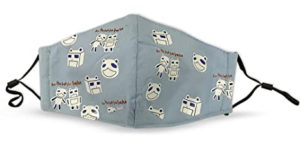Doctors’ Notes
BackHelping School-Aged Children Wear Masks
We know some children are having a hard time wearing masks during the coronavirus pandemic, and with the possibility of in-person school returning in the Fall, we’ve gotten lots of questions from parents about how to help them do it.
 While it’s tempting to want to excuse them, the mask recommendation is an important safety precaution that will likely be around for a long time. So it’s worth the work to get them to wear one, and to understand the importance of wearing one.
While it’s tempting to want to excuse them, the mask recommendation is an important safety precaution that will likely be around for a long time. So it’s worth the work to get them to wear one, and to understand the importance of wearing one.
Here are some helpful tips — including ones for children with special needs — to encourage school-aged children to wear a mask…
Model
This is probably the most important strategy! Kids often want to do what their parents are doing, so you can help make it fun and familiar by wearing a mask too. Modeling mask-wearing also shows kids how important it is for us all to help protect each other, and to do our part to keep everyone safe and healthy: I wear my mask to protect YOU. You where your mask to protect ME.
Mirror
When wearing or trying masks, have kids look in a mirror, so they can see how they look. (They might think they look cool!) This offers a great chance to talk about it too. This can be helpful for younger children and those with sensory issues.
Choose/Decorate
Let kids choose, and even decorate, their own masks. Getting to pick a favorite color, pattern, or character may help them like and want to wear one. Let them decorate it by coloring, applying stickers, or bedazzling. Turn it into a fashion trend! (Just be sure to explain that swapping masks at school isn’t a good idea!)
Play
For younger children or those with anxiety, putting masks on their favorite stuffed animals, dolls, or action figures may help. Turning it into a game or a social media “mask challenge” with their friends could be fun and helpful as well!
Look
Show them pictures of other kids, or adults, or even favorite characters wearing masks.
Praise
Positive reinforcement is always a good thing! Offer praise or small rewards when they wear their masks.
Understand
It may be difficult, but be patient whenever possible. Kids are always looking for ways to be independent, and there will be times when they may not want to leave their mask on. But this is a skill that all can learn with persistence!
Here are a few links to some of our favorite resources with more helpful tips and info:
KidsHealth | Healthy Children | Cook Children’s Hospital
Mask Exemptions
Some parents have asked for letters to exempt their child from wearing a mask at school. New CDC guidance does consider the challenges with children with special needs, including those with developmental delay, autism, severe anxiety, and sensory issues. Rather than a full exemption, we support requesting short breaks in school from the mask — while maintaining social distancing! For children with anxiety, working with a therapist using exposure therapy and coping techniques would also be part of a good treatment plan.
Under current CDC guidelines, having asthma does not exclude a child from mask wearing, since masks do NOT decrease oxygen levels or increase carbon dioxide levels.
For advice on helping young children and toddlers wear masks, see this Doctor’s Note.
As always, if you have questions or concerns, give us a call in the office anytime.
Dr. Lisa Stefano has been a Kids Plus Provider since 2019.